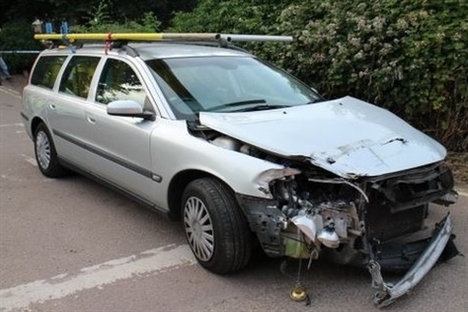19.12.14
Network Rail must re-assess safety at all user-worked crossings - RAIB
Network Rail has been told to implement a “time-bound plan” for the re-assessment of train sighting arrangements at all user-worked level crossing (UWCs), especially where safe use depends on vehicle drivers ‘sighting’ approaching trains.
The recommendation comes in a new Rail Accident Investigation Branch (RAIB) report, based on its inquiry into an incident where a passenger train approaching Woodbridge station in Suffolk hit a car at the Jetty Avenue UWC.
At the time of the collision in July 2013, there were no telephones or warning lights at the crossing, so safe use depended on vehicle drivers looking for approaching trains.
The car driver, an occasional user of the level crossing, normally relied on checking for trains by looking up and down the railway when swinging open the vehicular gates on foot.
He knew his view of the tracks would be obscured as he returned to the car and drove it towards the crossing, the RAIB said.

However, a curve in the railway meant the train involved in the accident was not visible to the car driver when he was at the crossing, and could only be seen from this location after the driver had returned to his car.
The RAIB’s investigation found that instructions given to car drivers using this, and similar, level crossings were inadequate.
According to September 2013 statistics, Network Rail-controlled infrastructure has 679 UWCs and 1,648 UWCs with telephone.
RAIB also found that Network Rail’s method for ensuring that vehicle drivers have an adequate view of approaching trains was “incompatible” with the characteristics of both the car involved in the accident and many of the vehicles expected to use crossings of this type.
Since the accident, telephones have been provided at Jetty Avenue level crossing, and the crossing signage has been changed to require all road vehicle drivers to telephone the crossing operator before using the crossing.
The RAIB has not assessed whether this is the most appropriate solution at this location, but notes that providing telephones at level crossings can have drawbacks. For instance, it increases the workload of the level crossing operator (normally the signaller), and some vehicle drivers may not use the telephone, despite being required to do so.
The RAIB has now told Network Rail to implement a “time-bound plan” for the re-assessment of the sighting of approaching trains at all UWCs where safe use depends on vehicle drivers sighting approaching trains. The time-bound plan should also cover implementation of any mitigation needed to permit safe use of such crossings.
Additionally, Network Rail should research measures to improve the safety of UWCs where vehicle users are reliant on sight to detect the approach of trains. The findings of this research should then be used by Network Rail to improve and clarify existing standards related to the design (including gates, signage and road markings), management of UWCs, guidance provided to users and training/briefing to relevant staff.
The infrastructure owner should also review and potentially modify its processes so that staff checking level crossing signage have a practical and easily used means of establishing the signage required at each crossing they are inspecting.
In consultation with the Office of Rail Regulation (ORR), Network Rail has been asked to review, and if necessary amend, the criteria used to calculate crossing times with reference to vehicle speed, the time taken to reach a decision when to start crossing and vehicle length.
RAIB also noted that the ORR should provide duty holders with enhanced guidance which reminds them that, when determining the position of decision points at UWCs, they must take due account of the characteristics of vehicles likely to use the crossing and recognise that a minimum dimension of 3m from the nearest rail is insufficient for most vehicles.
A Network Rail spokesperson told RTM: “Britain has the safest major railway in Europe and incidents such as this are incredibly rare. We are always looking for ways to improve safety at level crossings, including closing 500 crossings across the country over the next five years. Where we cannot close a crossing we will look for ways to make it safer, which is what we have done at Jetty Avenue.
“Telephones and new signage have been installed at this level crossing and we now have a dedicated level crossing manager accountable for all aspects of the crossing’s operations and risk management and makes regular contact with crossing users to ensure everyone understands how to cross safely.”
(The lead photo is extracted from the RAIB report; the car damage image from the Jetty Avenue incident c. Network Rail)
Tell us what you think – have your say below, or email us directly at [email protected]